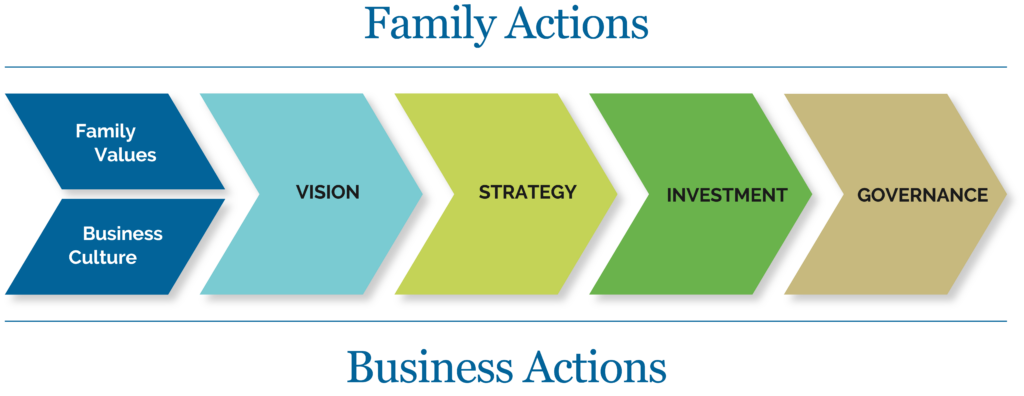Family harmony is a critical component to a strong family business. Alignment in vision and values and strong commitment from family members helps business leaders to make tough decisions that will steer the company in an appropriate direction. Family harmony and competitive advantage can result from this alignment.
What does family harmony mean? It means the ability to trust and support, communicate differences in a constructive manner and look beyond the self (and immediate family) at a broader picture. It means continuous work and constant reflection on actions that keep a healthy connection with the family as a larger unit. Family harmony does not mean there are no arguments. It does not mean sacrificing the self to be subsumed by the larger whole, without voice or choice. As Randel Carlock and John Ward state in their book When Family Businesses Are Best: The Parallel Planning Process for Family Harmony and Business Success: “Business interactions are professional and temporal, meaning that plans require clarity and a relatively short time frame; family relationships, in contrast, are emotional and last forever.”
Structuring Values
Family harmony can be aided by focusing on a simple structure to identify and clarify family values and using those values as guideposts in family and business vision, strategy, investment and governance.

But identifying and clarifying family values isn’t enough. It takes real courage and tenacity to make sure future family decisions and actions are based on values. Just as empty business values can create cynical and disheartened employees, so too can empty family values create cynical and mean-spirited family members. Adhering to common family values can steer the family towards productive behavior and appropriate business decision making.
Patrick Lencioni argues in “Make Your Values Mean Something” (Harvard Business Review, July 2002) that businesses need to identify their core values. He suggests that there are four different types of values: core values, aspirational values, permission-to-play values and accidental values. Lencioni asserts that companies which identify, cultivate and adhere to their core values achieve a distinct competitive advantage; so, too, can a family. When business owning families cultivate and adhere to their core values, they give the company and their family an advantage in prospering over the generations to come.
Values in Action
As consultants to family business, we often begin our work with families by helping them identify their core values in action terms. Many times, when we ask about their values, we get answers like “respect, integrity, honesty.” Sometimes families identify these values, but then don’t live by them on a day-to-day basis. One family had spent considerable time on a values exercise coming up with the following list:
- Honesty
- Integrity
- Caring
- Supportive
- Togetherness
- Generosity
- Respect
The family truly believed in these values but their everyday experiences with each other were in conflict with this vision. This family’s sibling group was mired in competitiveness, hurt feelings and mistrust. In-laws were perceived as out-laws and the parents had positioned themselves as arbitrators and communication conduits for their children. At one point, the siblings hadn’t talked to each other in quite some time. Many of the values they had listed were aspirational values. The values of “caring, supportive, togetherness, and respect” simply were not their values in action. It was what they wanted their values to be – what they aspired their values to be – but it wasn’t supported by their behavior. Unfortunately, the group did not have enough trust built up between them to develop the tenacity needed to achieve their aspirational values.
Achieving Actionable Values
We spent time honing their list of values and breaking them into three of the four components described by Lencioni: core, aspirational and permission-to play. Core values consisted of honesty and generosity. The values of integrity and respect were identified as permission-to-play values – simply those values that were deemed necessary in each of us as a human being to belong to a group. Finally, the aspirational values were identified and honed to work towards as a common goal for the family.
At each meeting, the values were reviewed and each individual was asked to reflect on how they did or didn’t live those values since we had last met. Each family member did a lot of soul-searching, reparation and subtle changing to help the larger family work through their challenges. By naming the value and the behavior associated with that value, the family was able to identify how they could modify their actions to start living the values they deemed important.
Unfortunately, many families have an expectation that their family has certain values, but the mismatch between values and actions leads to disappointment, ill will and hard feelings. Ultimately, the family mentioned here reached “caring and supportive” as core values in their actions. Through courage and tenacity, the family was able to identify, clarify and ultimately live their core values. As a result, some of their other aspirational values turned to core. Today, the resulting harmony in their family has given their business a competitive advantage over others in their industry because of the time, courage and adherence given to their core values.
Aligning Values for Future Generations
Another family that had gained considerable wealth from their family enterprise was concerned about the next generation coming of age. The first-generation parents had created the wealth and were anxious about the potential for entitlement, division and squandering among their children and their families. Some of the siblings were employed in the business, and some were not. Their parents had done considerable estate planning but had not communicated any details to their children. Soon, the siblings (and their families) would receive some of the benefits of ownership due to the estate planning.
To help the family deal with their concerns about carrying the values forward, we worked in distinct groups: the wealth-generating parents as one group, and each sibling and their spouse as the other groups. Each person had to choose 10 values (out of a provided list of 50) that they believed identified their family. Then they were asked to rank the top five in order of importance. When the entire group met again, each subgroup identified their values and the family then worked to find a common thread among all the values presented.
The next step was to associate the values with behaviors in the family. What they discovered was considerable agreement with each other over their core values and the associated behaviors of those values. The first generation parents were pleased to see their children and spouses were grounded in the same values that they were, and that it showed in the way they treated each other. As with many families, the siblings couldn’t be more different in their personalities, but when it came to their values, they were remarkably similar and aligned. Developing this understanding about the values of the second generation created a bright spot for the future of the enterprise, as well as for the family. The siblings trusted each other because of their alignment and were poised to make intelligent decisions regarding the future of the family enterprise and the wealth they were going to receive.
As a family grows through generations, it is even more important to identify and clarify the family values in order to maintain the harmony needed in a family enterprise. Additions to the family through marriage bring in new values which can be beneficial to the nuclear family, but may pull at the core values once identified by the initial enterprising family. Each generational group should review the core values of the previous generation (along with the associated behaviors) to ensure the alignment of family values to drive vision, strategy, investment and governance. This can be true for an operating company, a foundation or possibly a family office.
Values alignment helps to clarify why the family should remain together as shareholders, and helps the enterprise gain an advantage – because of family harmony.
Excerpts from: Carlock, Randel S. and Ward, John L. When Family Businesses Are Best: The Parallel Planning Process for Family Harmony and Business Success. New York, NY: Palgrave Macmillan. 2010. Page 32 and 53.

